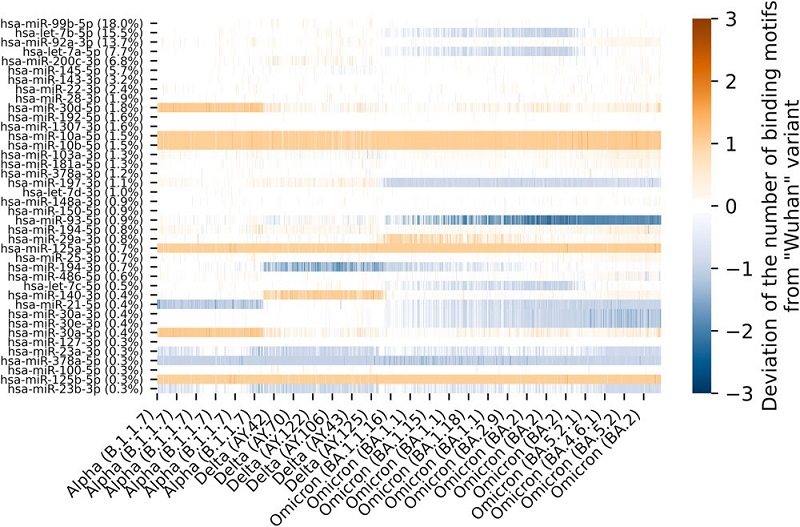BREAKING NEWS! International Study Shows That Human Intestinal miRNAs Play A Role In SARS-CoV-2 Evolution!
COVID-19 News - Human Intestinal miRNAs - SARS-CoV-2 Evolution Jul 30, 2023 2 years, 6 months, 2 weeks, 19 hours, 31 minutes ago
The signature of SARS-CoV-2 evolution reflects selective pressures within human guts where viral persistence is an issue!
COVID-19 News: In a groundbreaking collaboration between researchers from HSE University in Moscow-Russia, Sun Yat-Sen University in Shenzhen-China, and George Mason University in Virginia-USA, a remarkable discovery has been made about the role of human intestinal microRNAs (miRNAs) in shaping the evolution of the SARS-CoV-2 virus.
 Amounts of the binding motifs in analyzed severe acute respiratory syndrome coronavirus 2 (SARS-CoV-2) variants and in the reference “Wuhan” variant differ. Here, microRNAs (miRNAs) are sorted according to their levels of expression in the intestine. The shares of miRNAome represented by particular miRNA are indicated next to miRNA IDs.
Amounts of the binding motifs in analyzed severe acute respiratory syndrome coronavirus 2 (SARS-CoV-2) variants and in the reference “Wuhan” variant differ. Here, microRNAs (miRNAs) are sorted according to their levels of expression in the intestine. The shares of miRNAome represented by particular miRNA are indicated next to miRNA IDs.
MicroRNAs are small RNA molecules that are known to bind to the genomes of RNA viruses, influencing their translation and replication. Drawing upon samples from the GISAID database, which contains a vast collection of SARS-CoV-2 sequences from London and Berlin, the researchers divided the sequenced viruses into two distinct groups: the "Ancestral variants" and the "Omicrons." These groups were then subjected to a comprehensive analysis through the lens of tissue-specific binding between host miRNAs and viral messenger RNAs.
The research team made a remarkable discovery. They found a significant number of miRNA-binding sites within the NSP4 region of the SARS-CoV-2 genome, indicating evolutionary pressure exerted by human intestinal miRNAs. Notably, the NSP4 region plays a crucial role in infected cells by promoting the formation of double-membrane vesicles. These vesicles serve as scaffolds for replication-transcriptional complexes and also protect viral RNA from intracellular destruction.
Over the course of three years of the pandemic, the SARS-CoV-2 virus underwent significant mutations, with thousands of advantageous, deleterious, or neutral mutations being detected. Many of these mutations were silent nucleotide changes that got fixed in the virus genome. The researchers hypothesized that miRNA binding may have influenced these mutations, affecting the evolution of the virus.
The human body contains numerous miRNAs, with differential expression across various tissues. The researchers focused on miRNAs expressed in the lungs and intestines, as these are the main sites where the virus replicates. While the lungs exhibited specific miRNAs, such as hsa-miR-143-3p, hsa-miR-21-5p, hsa-miR-22-3p, and hsa-miR-30a-5p, the intestines showed a more uniform profile, including tissue-specific let-7b-5p, miR-92a-3p, and miR-200c-3p.
Intriguingly, the study team observed a loss of many miRNA-binding sites, particularly within the NSP4 region, during the pandemic. Monte Carlo simulations confirmed that these changes were particularly significant in the miRNAs expressed in intestinal tissue. The virus's ability to replicate in the intestines for prolonged periods provided ample time for evolutionary forces to act on the viral population, with host miRNA binding potentially driving this evolution.
One of the most remarkable fi
ndings was the pronounced decrease in miRNA-binding sites among BA.2-like SARS-CoV-2 variants. This reduction was attributed to mutations within the region encoding the NSP4 protein, which plays a critical role in facilitating viral replication. These miRNA-driven alterations in NSP4 may have contributed to the current global dominance of the descendants of the BA.2 lineage.
The study's findings also shed light on the significance of the intestinal site for the pathogenesis of COVID-19.
Although the lungs are primarily associated with respiratory complications, the intestines also play a vital role. Intestinal viral persistence can lead to prolonged inflammation, contributing to complications and long COVID as covered in various past
COVID-19 News reports.
https://www.thailandmedical.news/news/breaking-covid-19-news-millions-unknowingly-harbor-sars-cov-2-in-their-gut-with-viral-persistence-contributing-to-long-covid
https://www.thailandmedical.news/news/breaking-sars-cov-2-persists-in-intestinal-enterocytes-up-to-7-months-after-symptom-resolution--viral-persistence-is-real-and-a-serious-issue
https://www.thailandmedical.news/news/breaking-study-reveals-compartmentalized-sars-cov-2-infection-in-the-human-body-according-to-tissue-types,-providing-evidence-of-viral-reservoirs
https://www.thailandmedical.news/news/breaking-covid-19-news-finally,-u-s-nih-warns-sars-cov-2-viral-persistence-is-a-serious-issue-that-is-also-affecting-long-covid
As with any research, this study has its limitations. The analysis focused on miRNA regulation through reverse complimentary binding of the seed region, but other modes of regulation may also play a role.
Overall, this groundbreaking research reveals the intricate interplay between human intestinal miRNAs and the evolution of the SARS-CoV-2 virus. The findings not only deepen our understanding of COVID-19 but also open new avenues for developing targeted therapies and interventions to combat the virus's evolution and mitigate its impact on global
health. The collaboration between researchers from different countries highlights the importance of international cooperation in tackling global health challenges.
The study findings were published in the peer reviewed Journal of Medical Virology.
https://onlinelibrary.wiley.com/doi/10.1002/jmv.28996
For the latest
COVID-19 News, keep on logging to
Thailand Medical News.
